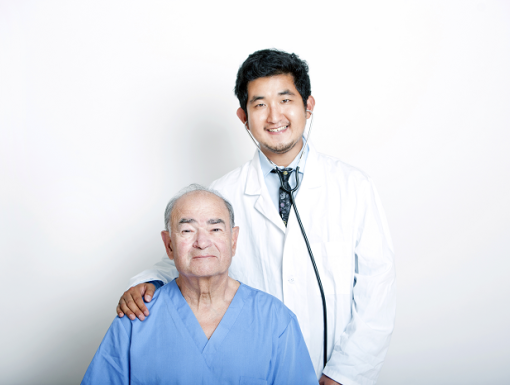
What Motivates Doctors and What Advice They Have for You
We interviewed four physicians of varying specialties to learn what makes them tick and the advice they give to patients to make their experience with healthcare better.
 William Bennett, MD, PhD is a cardiologist in Greater New Orleans that has been practicing medicine for 8 years.
William Bennett, MD, PhD is a cardiologist in Greater New Orleans that has been practicing medicine for 8 years.
Ochsner: Why did you become a doctor?
Dr. Bennett: My desire to become a cardiologist stemmed primarily from my environment. I grew up in a single parent home, in an impoverished inner-city housing project. In this world, healthcare was viewed as an unaffordable luxury. As a result, cardiovascular disease went unchecked and served as a leading cause of death.
All my life, I watched the health of the community and my family suffer at the hands of this devastating disease. My decision to embark on a career in cardiology stemmed from a desire to fight this crippling disease and make a difference in the lives of those who are affected.
Ochsner: What tips would you share with patients that would improve their experience with healthcare?
Dr. Bennett: Ask your doctor to educate you on your health problems and goals of care. By understanding your health problems and staying in tune with your body, you can become an active participant in your healthcare.
Ochsner: What’s one of the most common questions that your patients ask you?
Dr. Bennett: “Is my heart ok?”
 W. Stephen Choate, MD is a sports medicine fellowship-trained orthopedic surgeon in New Orleans and has practiced medicine for 6 years.
W. Stephen Choate, MD is a sports medicine fellowship-trained orthopedic surgeon in New Orleans and has practiced medicine for 6 years.
Ochsner: What motivates you as a doctor?
Dr. Choate: I'm motivated to be the best at what I do to ensure my patients receive the best care possible. It is rewarding to restore or improve someone’s quality of life. Nothing bothers me more than an adverse outcome or unhappy patient.
Ochsner: What tips would you share with patients that would improve their experience with healthcare?
Dr. Choate: Like many things in life, communication is key. Listen, ask questions and take ownership of your healthcare. Make your expectations known, and make it a priority to understand those of your surgeon. The doctor patient relationship is built on trust. Seek care where you're most comfortable.
Ochsner: What’s one of the most common questions that your patients ask you?
Dr. Choate: “How bad is this injection going to hurt?”
 Natasha Goss-Voisin, MD is an OB/GYN in Raceland, LA who has been practicing medicine for 5 years.
Natasha Goss-Voisin, MD is an OB/GYN in Raceland, LA who has been practicing medicine for 5 years.
Ochsner: What is the most rewarding thing about being a doctor?
Dr. Goss-Voisin: I absolutely love that I get to become a part of each family that I care for. There is a unique bond that develops when you are taking care of the daughter, sister, mother or grandmother in the family. I am trusted to be the one that delivers the new baby. I am usually a part of the very first family photos. I am there for the happiest moments of a family's history.
Ochsner: What tips would you share with patients that would improve their experience with healthcare?
Dr. Goss-Voisin: Communicate with your physician and the care team. Tell us what we're doing wrong (and right) so that we can make it better. We want to do our very best to take care of you, and we need your involvement. Love your body and take care of it; it’s the only one you get.
Ochsner: What’s one of the most common questions that your patients ask you?
Dr. Goss-Voisin: “Why did you choose to specialize in gynecology?”
 Myriam Ortiz de Jesus, MD is a pediatrician in Zachary, LA that has been practicing medicine for 26 years.
Myriam Ortiz de Jesus, MD is a pediatrician in Zachary, LA that has been practicing medicine for 26 years.
Ochsner: What motivates you as a doctor?
Dr. Ortiz: My main motivation and the reason I became a pediatrician is to have the opportunity to impact the health, well-being and quality of life of children; not only through direct patient care but also through education.
Ochsner: What tips would you share with patients that would improve their experience with healthcare?
Dr. Ortiz: My advice to parents is to remember the importance of preventative healthcare checkups for your children, not only in the first years but also as they get older. This is especially important during the adolescent years. Another tip is to write down your questions in advance so you can get the most of the visit.
Ochsner: What’s one of the most common questions that your patients ask you?
Dr. Ortiz: The most common questions parents ask are regarding immunization need and safety.



